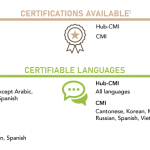 One of the most frequent questions we get is how to become a certified medical interpreter in the U.S. The process involves first getting trained in medical interpreting, then getting certified.
One of the most frequent questions we get is how to become a certified medical interpreter in the U.S. The process involves first getting trained in medical interpreting, then getting certified.
Professional certification is currently available in the U.S. from just two organizations: Certification Commission for Healthcare Interpreters (CCHI) and National Board of Certification for Medical Interpreters (NBCMI).
See this chart comparing CCHI and NBCMI. You can get certified by these organizations for any spoken language.
What is the difference between a healthcare interpreter and a medical interpreter?
Some in the industry feel there’s a difference: A healthcare interpreter handles communication between patients and medical staff. A medical interpreter handles communication between medical staff only. At InterpreterEd.com, we do not distinguish between the two terms: A healthcare or medical interpreter handles communication in a medical setting, which is usually between patients and medical staff.
Why is professional certification important to have?
Certification establishes you as a true and competent professional in healthcare interpreting who knows and follows current standards of practice in the field. More and more employers prefer certified healthcare interpreters.
Getting Trained
To start your training, you should meet the first minimum requirements for certification:
- Be at least 18 years old
- Have a high school diploma, GED, or the equivalent from another country
It is recommended to already have your high school diploma or GED before you begin training. Training can be intense and you’ll need to concentrate. Most people already meet this requirement before they train. - Be sufficiently bilingual in English and another language
If you elect to take our healthcare interpreter training course, we will test your language proficiency. We call this a bilingual assessment. All potential students must take and pass this assessment to be enrolled in our training course. We provide a document that states you passed your assessment, which you will need in order to apply for certification.
To train, look for a medical interpreter training course that offers a minimum of 40 hours of training. You can learn more about our comprehensive 60-hour course here.
At the end of your training, you’ll take a final exam. If you pass, you’re given a certificate of completion—and then you will have met the final minimum requirement for certification:
- Successfully complete a minimum of 40 hours of medical interpreter training
Getting Certified
After meeting these minimum requirements to get certified, you then apply to either CCHI or NBCMI to take their certification exam. You will need to submit documentation to prove you’ve met the minimum requirements. Be sure to read through all the application details on their websites. CCHI and NBCMI schedule exams throughout the year.
Once you pass their exam, you will have earned professional certification and you can be listed in their online national registry. (You may also opt to obtain certification from both organizations.) To maintain your certification status, you must earn continuing education hours and healthcare interpreting experience hours, following the rules set out by CCHI or NBCMI.
Certification from CCHI and NBCMI is recognized and respected nationally—and we strongly encourage all of our students to become certified.
“[My instructors], Ms. Cerna and Ms. Haas, made it possible for me to complete the course with ease and with their excellent experience and knowledge. I will be forever grateful for them.”
–Edith E., InterpreterEd.com graduate, 2021; currently a healthcare interpreter at a county hospital and pursuing professional certification



